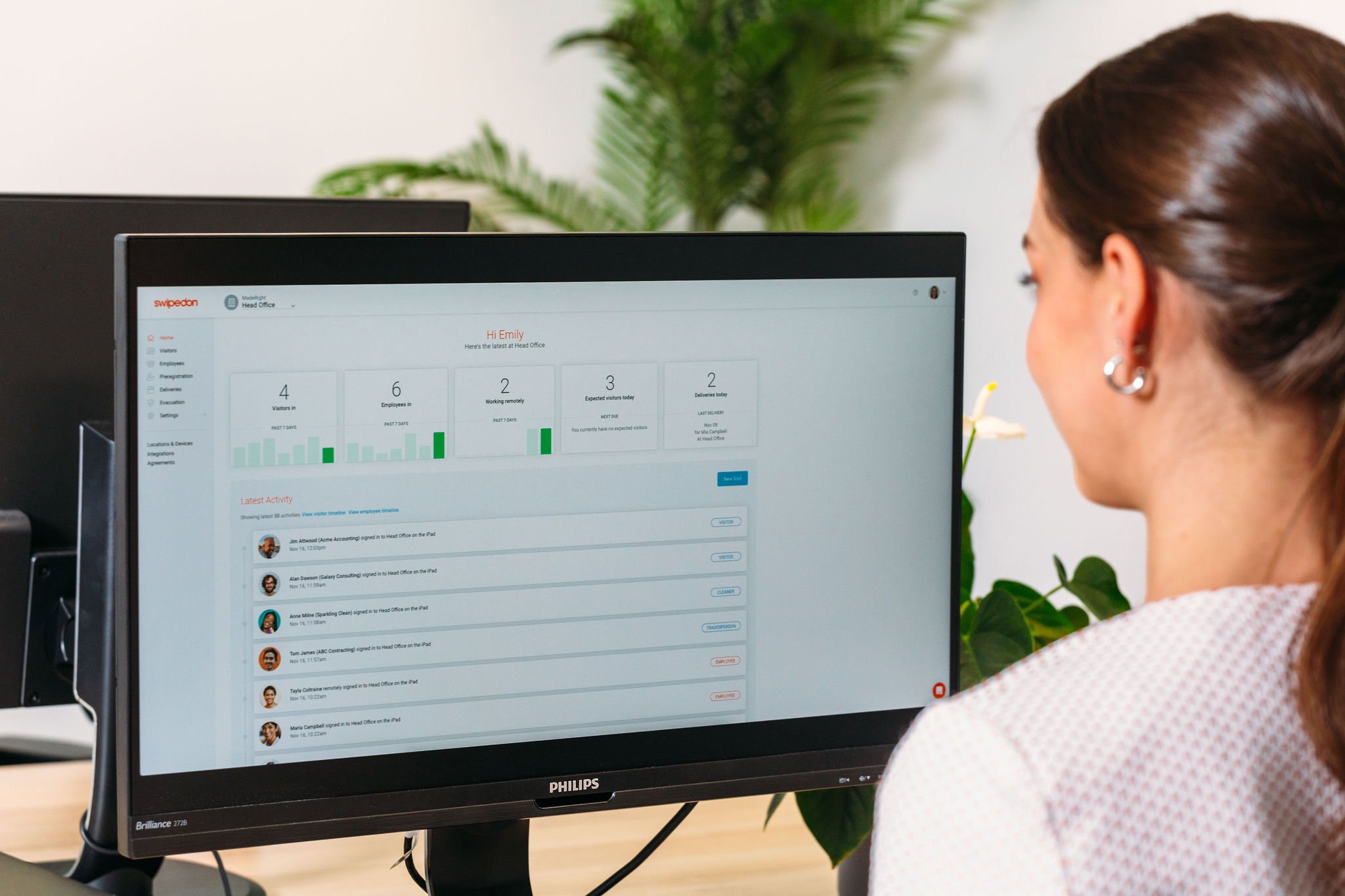Does Your Visitor Management Process Comply with Data Privacy Laws?

In the last decade, compliance regulators around the world have bolstered data privacy laws to keep up with modern times.
Initially, the General Data Protection Regulation (GDPR) applied to European Union countries, and it was used as a guide for industry best practice elsewhere in the world. More recently, other countries have enacted their own versions.
Data privacy regulation is also a fast-moving field, where law-makers are looking to keep pace with evolving threats and technologies.
For example, the US created the California Consumer Privacy Act in 2019, and in the years since more than 20 other states have adopted their own laws. Australia’s Privacy Act of 1988 may sound like it’s decades old, but it’s also undergone significant change in recent years.
It’s important to remain vigilant and monitor systems to ensure your organization doesn't get caught out when laws are updated.
Regardless of what jurisdiction you fall under, it’s crucial for all businesses to know and comply with all relevant data privacy laws. Any system, including your visitor management system (VMS), that collects and stores identifying or contact information of any individual, is required to satisfy strict standards.
In the specific case of a VMS, there are a handful of things to pay particular attention to. This is your guide to ensuring your VMS satisfies data privacy laws, wherever you are in the world.
Understanding Data Protection Regulations
A 2022 attack on Illuminate Education, a provider of tracking software in schools, resulted in data breaches for many school systems, including New York City Public Schools and the Los Angeles Unified School District.
Data protection laws exist to prevent this kind of information being accessed or stolen.
There are many common aspects of different data privacy laws. The GDPR was a world-leading piece of legislation for many years, and in some respects it still is, as it has provided the backbone of data privacy law in the United States, Australia and elsewhere.
In addition, organizations that work in various sectors face further data security responsibilities. For example, businesses that provide services to the US military must comply with the International Traffic in Arms Regulations (ITAR).
Whatever the standard for data privacy within individual country regulations, the law tends to have the same intent: to uphold an individual’s right to privacy, often as laid out in human rights legislation.

On a broad scale, data privacy compliance means businesses collect and keep any sensitive information about individuals in such a way that it cannot be accessed, obtained or used by anyone else.
This includes cyber criminals who perpetrate scams or attacks online, advertisers who may seek to target certain demographics with their marketing, as well as employees, contractors and anyone else who might come into contact with information your organization is responsible for keeping private.
When data is made vulnerable, it may not be as a result of anything your organization has done. Third party breaches typically occur where contractors or service providers are attacked by cyber criminals who gain access to all the information that party is privy to.
It’s important to note that organizations can still be found to have violated data privacy regulations in a third party breach. It’s important to ensure any third party service provider is compliant with the relevant laws - this includes your visitor management systems provider.
The Dangers of Not Complying with Data Privacy Laws
There are both regulatory and reputational consequences for not complying with data privacy laws. In both cases, there is the potential for substantial penalties.
- EU organizations that violate GDPR can be fined up to €20 million, or 4% of global turnover for the previous tax year - whichever is greater.
- In Australia, organizations can be fined up to AUD$2.22 million
- In the United States, the Federal Trade Commission can issue fines of up to $40,000 per violation. Every day an organization is non compliant is considered a separate violation, which is one reason why Facebook was fined $5 billion for breaking data privacy laws in 2019.
In addition to these regulatory penalties, organizations may be liable for extra charges if the victims of non-compliance choose to seek compensation.
On top of that, there are huge reputational risks. As society en masse gains a greater understanding of cybersecurity and the risks of having their information fall into the wrong hands, they are less willing to tolerate data privacy violations.
According to McKinsey, 87% of participants in one survey said they would not do business with a company if they were concerned about its security practices.
Key Requirements for Compliant Visitor Management Systems
If you’re still using outdated visitor management strategies, chances are, you could unknowingly breach privacy regulations.
Here are the requirements you need to know about your VMS.
Visitor Consent
Before collecting any data whatsoever, you must obtain permission from your visitors.
Consent must be freely given, specific, informed and unambiguous. It must also be voluntary, which means allowing people to opt in or out of data collection.

Defined Purpose
If you’re going to gather information about others, there needs to be a good reason.
As mentioned in the SwipedOn GDPR eBook, your VMS gives you the legal basis for collecting specific data. For example, you might need it for:
- Data security protocols (e.g., company non-disclosure agreements)
- Health and safety (e.g., potential office evacuations)
- Physical security procedures (e.g., reducing the spread of contagious diseases)
Any data that a business collects must fall within your mandate, and it can only be used for its intended purpose.
Transparency
Consent alone will not guarantee that your organization is allowed to collect visitor data. It must also be clear how you plan to use the gathered information.
Besides giving notice when you plan to collect data, that data must also not be used unethically. Implementing a digital visitor agreement can guarantee this.
Visitor agreements should be easy to read and outline how the information will be used. Visitors should also be sent a digital copy of the agreement so they know their rights.

Data Access and Security
When data is collected, it can only be stored for as long as the information is needed. Afterwards, the data must be deleted. You must also make sure that data is only accessible to those who need it.
Challenges in Traditional vs Digital Visitor Management
Traditional visitor management methods put organizations at a considerable risk of violating data privacy laws in two key ways:.
- A visitor book for signing in and out could be stored for an excessive amount of time.
- Visitor data is also displayed on a page for anyone else to see.
Today’s digital visitor management solutions help to avoid these problems. A VMS allows organizations to delete data as soon as it is no longer needed, encrypt and secure data so it can only be accessed by authorized individuals, and centralize the storage of sensitive data. Extra layers of security can also be added, such as passwords.
Similarly, digital technologies can also be easily updated to keep pace with data laws. This not only prevents your organization from being prosecuted when regulations change, but it also helps to ensure the information of your visitors is kept private - which, of course, is the whole point of data security.
Implementing a Compliant Visitor Management System
In adopting a VMS, you will naturally assess its functionality and how well it performs to optimize the visitor experience at your organization.
It may be tempting to overlook the data security aspect, but this is just as important - if not more so - than how it works in practice.
It’s important to look for security compliance certification. If you can’t find it, ask. Talk to the provider about how their features perform against your relevant data security regulations.
There are a handful of specific aspects worth knowing:
- How do staff ensure appropriate use of the data that’s collected?
- What do staff need to do to ensure records are deleted as they should be?
- Are there additional workplace policies that need to be implemented with regards to the use of the VMS?
- What is the best practice for secure use of the VMS?
Our Happy - and Now Compliant - Customers
Mondetta
Mondetta utilized SwipedOn’s modern VMS to revamp its old, manual, cumbersome sign in experience.
At the same time, it also enabled the business to print badges for guests and visitors in a way that complied with the Customs-Trade Partnership Against Terrorism (CT-PAT) regulations.
STERIS
Before implementing SwipedOn, STERIS issued paper badges to guests. It had a sign out system, but often guests wouldn’t return badges, making it difficult to accurately monitor who was on site.
This presented a safety and compliance issue, particularly in the event of the emergency.
SwipedOn has made it much easier to keep track of people coming and going, including with auto sign in for staff to streamline the process.
Sunbeam Foods
As a food processing business, Sunbeam Foods is regularly audited against its requirements to record people who have been on site at any given time.
Using SwipedOn made the system much more reliable than its paper-based sign in process. Not only that, but it stores sign-in data and manages access in a way that complies with data privacy regulations, while also enabling the data to be provided for auditing.
Future-Proofing your Visitor Management
Regardless of where in the world you are, data security compliance is essential. Violating the regulations can cost your business big time. If you’re using offline visitor management processes, chances are you’re not fully compliant with your local regulations.
The easiest way to guarantee compliance is by using a VMS with built-in features. By creating agreements, allowing users to opt out of data collection, and using shield-encrypted software that you can update regularly, you can ensure you stay on the good side of official regulations, both now and into the future.
Find out more about how SwipedOn’s VMS can help your organization comply with data privacy laws, or sign up for a free 14-day trial to get started.








 Germany - Deutsch
Germany - Deutsch